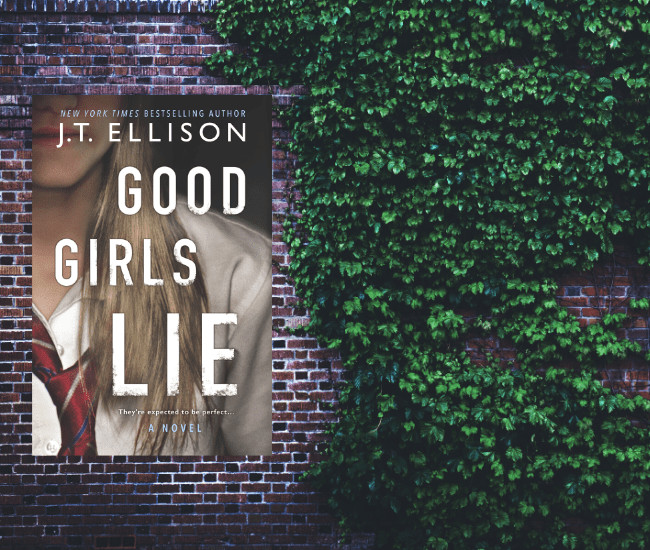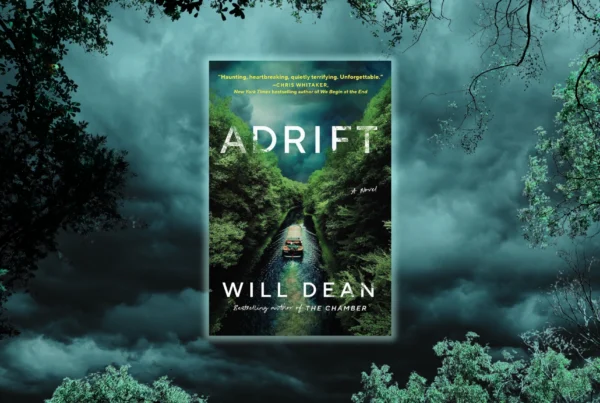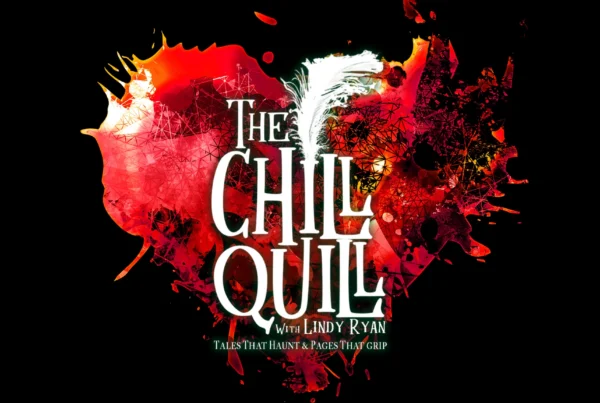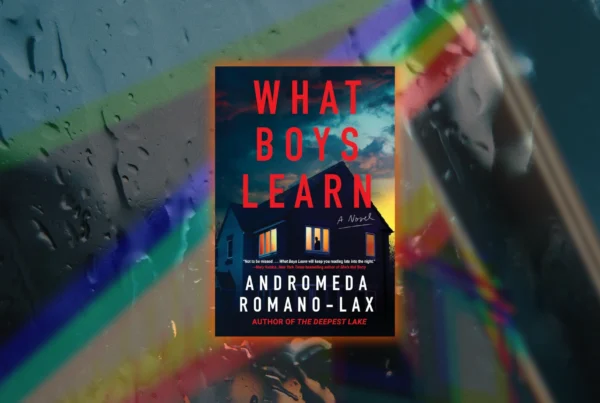J.T. Ellison’s new psychological thriller Good Girls Lie (Mira) is a whopper of a dark tale, a nail-biter bound to keep you reading beyond the midnight hour. Fair warning: Before you dive in, grab your comfiest pillow and blanket and prepare to enter the paradoxical world of The Goode School.
Perched “like a gargoyle” above the small town of Marchburg in the hills of Virginia, The Goode School’s brick walls are covered with ivy, reminding its wealthy female high school boarders they are bound for ivy league college educations come hell or high water.
Ash Carlisle arrives on campus not as a freshman, but as a sophomore, following the recent untimely deaths of both her father and her mother. Remember what it was like to be the new kid on the block? Stressful, right? Doubly so when you’re clearly an outsider from Oxford, England, and you’re taking pains to shroud your past.
OVERTLY SUSPICIOUS CLASSMATES
While the teachers and administration readily accept Ash, her roommate and classmates are another story. They are overtly suspicious of her as she tries to fly under the radar, determined not to call too much attention to herself. This six-foot beauty is there for one reason—to reinvent herself with an elite education, just like her mother wished for her.
She starts by requesting to switch out of piano studies, despite her musical talent being one of the reasons she was accepted at the school in the first place. Instead, she persuades Dean Westhaven to allow her to study computers, which turns out to be an easy decision for the dean after the piano teacher suddenly dies.
When she’s not writing as F.J. West or engaging in her own undercover extra-curricular activities, the dean keeps a watchful eye on her adolescent charges from an attic window high above the campus. In keeping with the seven generations of relatives before her, she ensures The Goode School’s simple rules are followed—no hair dye, no colored nail polish.
Above all, “The ladies of Goode will not be fake.”
GIRLS WILL BE GIRLS
Yet this group of 200 entitled teens is unlike their predecessors because, you know, girls will be girls…even at this elite private school. Goode girls bully, drink to excess, smoke and do drugs, get pregnant, commit suicide…and murder. Or do they?
Chaos ensues when Ash is tapped by Ivy Bound, one of The Goode School’s secret societies. Under normal circumstances, rush at the college level can be fraught with pranks that sometimes spin out of control. But Ivy Bound’s hazing isn’t normal and neither is The Goode School, so Ash is faced with quite the challenge when her past comes back to haunt her on top of this.
COMPLEX AND FAST-PACED
With her powerful character development skills, Ellison keeps us guessing who, what and why. She delivers a complex, yet fast-paced, suspenseful story that is sure to evoke intense emotional reactions from readers.
All things considered, it’s hard to believe this is my first J.T. Ellison thriller. While this book alone would be motivation enough for me to read more, her candid interview below seals the deal.
And that’s no lie.
Q: As a psychological thriller, Good Girls Lie is a nail-gripping ride of twists and turns. Did you specifically plan these out or did you go with the flow?
A: Normally, I’m a very organic writer, which means I don’t plan very much, preferring to let the story shape itself. But in this book, I knew the ending up front and was writing to it. It was actually a short story I’d started for another project, and when I got into the throes of this story, I realized I’d written the end immediately after I finished the opening. It necessitated several plotting sessions, and a few great calls with my editor, to make the rest of the book get into line.
Q: Setting and character play equally important roles in telling this story. Was that your intention? Which do you prefer writing and why?
A: A story without a solid character will never get off the ground, but I feel setting is equally important, especially when you’re writing a gothic. I love for the reader to be able to visualize the world the character moves through. I have a cinematic style, and I’m drawn to books that have vivid settings as well as dynamic characters. It comes from being a visual learner, I think.
Q: You’ve cleverly connected the name of the school and the title of the book. Which came first?
A: The Goode School. I knew I wanted the juxtaposition of good girls, and Goode was the right name. This book was a bear to title, and given how perfect the final title is, I’m shocked we didn’t hit upon it sooner.
Q: Multiple points of view move the plot along. Without a big reveal, what were the challenges in crafting voice and tone?
A: Huge challenges in this one, unfortunately, mostly because as I was nearing the end of the draft, the point of view wasn’t right. Being so deeply into the book and struggling told me I needed to step back and take a second look at how I was telling the story. I switched a third-person chapter to first present tense and BOOM — the whole story gelled. I redid the first third of the book and sent it to my editor, who encouraged me to keep going in the new vein.
Q: Though set in an all-girl’s school, you’ve given several of the female characters gender-neutral names (e.g., Ford, Ash, Alex). Was this deliberate?
A: That’s something I find myself doing totally unconsciously, though readers have pointed it out to me many times. Names are so personal, so intimate. My inspirations come from many different places, but I don’t think ahead about the gender-neutral qualities, only that the names work for the characters. Ford Julianne Westhaven is clearly an onerous family name, one I selected after touring a home. I got into the car with the paperwork and saw Ford (the builder), Julianne (the style of home), and we were in a neighborhood called Westhaven. Ford was born. Ash is gentler, Alex sharper. There are plenty of feminine names in the story — Camille, Piper, Vanessa, Becca — but somehow, I always end up with names for my leads that can go either way.
Q: Dean Westhaven is an aspiring novelist, writing under the pen name F.J. West. The obvious similarity of her pen name with yours aside, what other characteristics or back story do you and the Dean share?
A: When I was in college — my single-sex college in the Blue Ridge Mountains of Virginia — I would sit in the window of my dorm rooms, staring out at the quad or the front lawn or the mountains, and dream of being a writer. Fall, winter, spring, I observed and assimilated. I was writing, intensely, for an English–Creative Writing major, with a second major of Politics, so every night was creative, either in fiction or nonfiction. It was very easy for me to slip into Ford’s skin, into her aspirations, to observe her from both the interior life and the exterior. A woman in the attic, in a room of her own, writing her way out.
Q: If it weren’t for the father’s behavior, there wouldn’t be a story. Yet his role and those of other males in the story are secondary. Was this purposeful?
A: Yes. This is a book about women who are extremely powerful, the teenage girls especially. This power stems from their backgrounds, yes, but their intellectual capital is what’s landed them at The Goode School. It’s not just about being rich, being the children of influential parents; it’s about being freaking smart.
Part of what I drew from my own education was the empowerment of the single-sex education. When a young woman is lauded for her intelligence, pushed to grow intellectually, rewarded for the hard work of maturing into a person of the world, is steeped in knowledge and doesn’t have to be in constant competition with men, it makes for an interesting dynamic.
It was a natural extension of the single-sex environs that men were at a minimum. They are such counterpoints to my powerful women: one abusive, one abused, one bright but meek, one loving but callous, ultimately rejected for that very reason. They had to stay in the wings instead of being the drivers of the story, supporters only, counterpoints.
Q: Why did you set the novel at a girls’ boarding high school rather than a college? Are you deliberately trying to scare the bejeebers out of readers who are parents of teenagers?
Yes! Setting it in high school was very purposeful for a single reason — a college girl, if pushed to the brink, would have the physical and emotional means to leave an abusive situation, whereas a teenager, especially one newly orphaned and across an ocean from her native land, would not have that luxury. I wanted Ash to be stuck, with no place to go, no options or means of escape, to have to see things through to the bitter end. If she were older, she could have said, “Oh, forget it, I’m out of here.”
And for the parents … I mean, teenage girls are a breed unto themselves, aren’t they?
Good Girls Lie is now available for purchase.
https://booktrib.com/wp-content/uploads/2019/11/J.T.-Ellison_hi-res.jpg
About J.T. Ellison:
J.T. Ellison began her career as a presidential appointee in the White House, where a nuclear physicist taught her how to obsess over travel itineraries and make a seriously good pot of Earl Grey, spawning both her love of loose leaf and a desire for control of her own destiny. Jaded by the political climate in D.C., she made her way back to her first love, creative writing. More than 20 novels later, she is an award-winning New York Times and USA Today bestselling author with millions of books in print, and is published in 28 countries and 16 languages. She is also the Emmy-award winning cohost of A Word on Words, a literary interview television show, and co-wrote the “A Brit in the FBI” series with number-one New York Times bestseller Catherine Coulter. She lives in Nashville with her husband and two small gray minions, known as cats in some cultures. She thinks they’re furry aliens. Visit J.T. at Facebook, Twitter, and Instagram for more insight into her wicked imagination.




